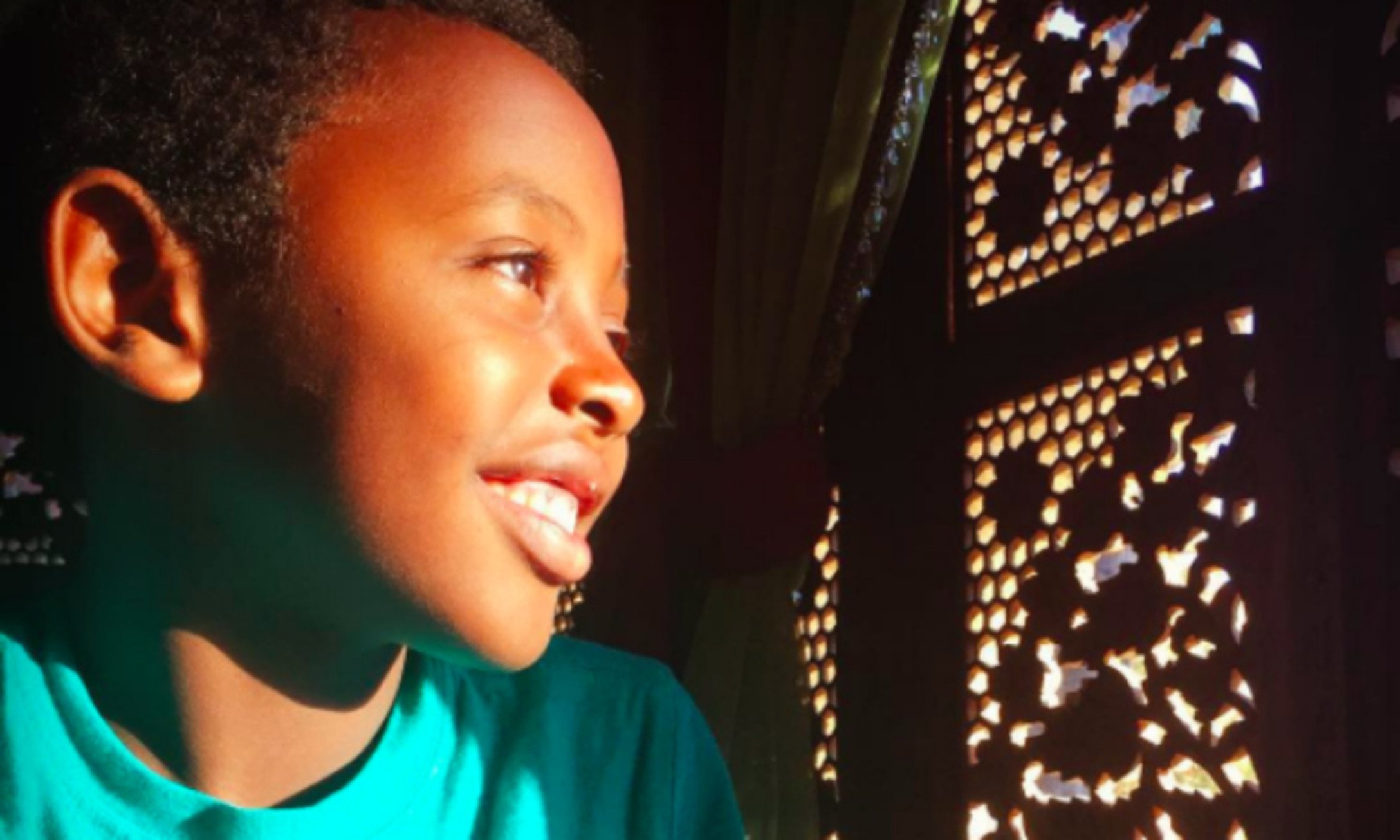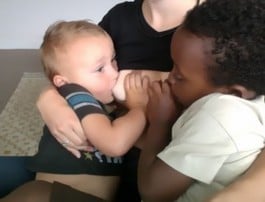
Having been breastfed by my mother until I was 6, I've know about breastfeeding my whole life. I've never thought of breastfeeding as something weird or unnatural or wrong, even when it's done beyond the infant years. I've always been aware of the importance of breastfeeding and the closeness it brings between a mom and her breastfeeding child.
Breastfed children do not normally use an inanimate item (such as a blanket or stuffed animal) to comfort themselves. They often use the closeness that breastfeeding provides from their mother and, so, it can also help children during times of stress or trauma.
RELATED: Nope, Work/Life Balance Should Not Be the Goal
Which is how it came to be that I would breastfeed my eldest son, Samuel, whom I adopted after he was taken away from his homeland, culture, language and family in Ethiopia—and, most importantly, his mother, who'd nursed him from the time he was born until the time, when he was 3 years old, she relinquished him for adoption. By the time he came to my family, he'd been stripped of his main source of comfort and connection, though that hadn't been clear to me at first.
I wish I could say nursing my adopted, preschool-age son was my idea. Truthfully, I thought he was too old to latch on to a new person for the first time.
I was wrong.
At first, Samuel seemed too timid to ask outright. You could see his fear of rejection when he showed the initial interest.
Samuel had been curiously watching me breastfeed his brother, Aram, who was 2.5 years at the time. Samuel didn't speak English, and we didn't speak his language. But in his curiosity he was able to convey that he was also interested in latching on.
I spoke to Samuel’s doctor, an M.D. specializing in adoption, and he was extremely supportive of the idea to offer him a spot nursing alongside his brother. His doctor was more concerned about my comfort level and wanted to alleviate any discomfort (due to cultural norms) that I had. He had no problem with whether or not it should be offered.
He said that, in response to Samuel's silent request, the answer was simply, yes. If I was comfortable, it most definitely should be an available option for support.

At first, Samuel seemed too timid to ask outright. You could see his fear of rejection when he showed the initial interest. When I asked him if he would also like to breastfeed, he smiled and jumped right on my lap. During our first experience breastfeeding, I could tell it was something he missed dearly—something from home I was able to give him.
In our situation, Aram and Samuel got along great right away, which was great. Still, no matter how much we tried to prepare ourselves for a new family member, the attachment process was not something logical (I suppose it never is.) Attachment seems to happen at the most basic and biological level. Here we had this new person in our home, and it felt very new. It was new! And yet, at almost 4 years old, he was also a stranger who we needed to get to know.
Aram thought this new child was fantastic, but I don’t think he really grasped the idea that he was his brother—or that I was the mother of both of them—until he realized that one of the most primal areas to seek comfort and security was also being offered to his playmate.
Breastfeeding signaled to them both that we all belonged together, to each other.
I thought I knew what there was to know about breastfeeding, back when Samuel was new to us. But I learned a lot of things I didn't know when Samuel and I started. Here are some other things I observed about adoptive breastfeeding:
-
Every person from Ethiopia I've encountered finds adoptive breastfeeding and extended breastfeeding totally normal. Apparently, wet/cross-nursing is still common in certain areas of the country. One Ethiopian woman said to me that, "If there is milk we use it!" Then she explained that breastfeeding 8-year-olds is not an uncommon practice (and, biologically, a normal length of time for primates to nurse).
-
Due to lack of exposure and understanding of breastfeeding generally and extended breastfeeding and adoptive breastfeeding specifically, most Americans are horrified by it.
I think of it as one of many tools that could potentially be used when parenting children who have experienced adoption-related trauma.
-
Breastfeeding helped my attachment to and bonding with my son.
-
It helped his attachment to and bonding with me.
-
It helped Aram understand Samuel's role in the family and that he was completely equal.
-
I definitely think that there is great reason (sometimes even more so than with a biological child) to practice "extended" breastfeeding with an adopted child.
RELATED: Why Syrian Men Caring For Kids Is So Surprising To Aid Workers
- I don't think breastfeeding is the end-all-be-all for attaching with your adopted child. If this is not an option for you, it is nothing to be overly concerned with. I do, however, want to bring this to the attention of other adoptive parents who may find it helpful for their own family. I think of it as one of many tools that could potentially be used when parenting children who have experienced adoption-related trauma.
I am so happy I was able was able to provide him with the comfort he needed to get through trauma—a kind of trauma most people will never experience in their entire life. Being able to breastfeed Samuel for almost a year was a beautiful experience.
Photographs by: Jamie Grumet
This article was originally published in June 2016.







